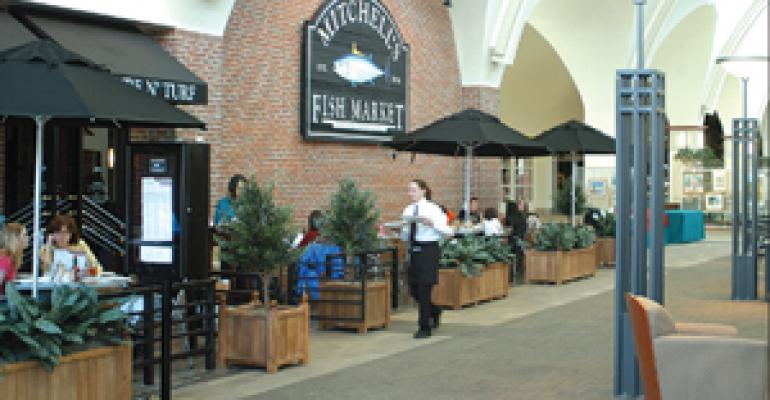Big-name national dinnerhouse chains are not the only players able to land choice locations in new and refurbished regional retail malls.
While mall developers have learned that chains like The Cheesecake Factory, P.F. Chang’s China Bistro and brands owned by OSI Restaurant Partners—including Outback Steakhouse, Fleming’s Prime Steakhouse & Wine Bar, Bonefish Grill and Cheeseburger in Paradise—are almost guaranteed to attract customers and to debut and pay rents on schedule, some landlords also are finding that local residents want to patronize restaurants that differ from the national-brand norm.
Indeed, strong regional chain operators, especially those with several concepts, increasingly are being picked to occupy some of the choicest spots in newer retail developments.
“We try to bring in a local or regional as part of what we are doing,” said Peter Haback, vice president of restaurant leasing for Chicago-based General Growth Properties, one of the nation’s largest regional mall developers and managers. “They give local flavor if they have a great business plan and are proven performers.”
Some of the smaller chains that have found success in several of General Growth’s malls are Stoney River Legendary Steaks, owned by Nashville, Tenn.-based O’Charley’s, and Ted’s Montana Grill, the chain launched by media mogul Ted Turner and Atlanta restaurateur George McKerrow Jr. In addition to those two, both of which have branches at General Growth’s new Cumberland Mall in Atlanta, the developer also has installed an outlet of Wildfire, a chain concept owned by Chicago’s Lettuce Entertain You Enterprises, at the Perimeter Mall in Atlanta, and has tapped the high-end Grill on the Alley chain from Los Angeles, and Sushi Samba Rio, another regional standout, for the Galleria mall in Dallas.
In cases where a smaller player may not be able to afford some of the higher rents, which can run $1,000 or more per square foot, landlords sometimes are willing to grant concessions to land a regional favorite. “If someone is the right tenant for a location, I’d like to think we can find a way to make it work for both sides,” Haback said.
Some regional restaurant companies have developed several concepts to give themselves more leverage when trying to convince a landlord that one of their restaurants would fit into a mall’s overall plan and help it avoid competitive conflicts in terms of lease guarantees of exclusivity in menu specialties and themes.
Restaurants-America has nine different concepts operating in about 45 locations, demonstrating its adaptability for custom fitting into a specific center’s tenant mix, according to Roger Greenfield, a partner in the Chicago-based company. Bar Louie, a casual bar and grill geared toward young adults, is Restaurants-America’s primary growth vehicle, and has 21 units in operation.
But three of the company’s newer concepts have debuted in the past year. They are Townhouse Restaurant & Wine Bar, Midtown Kitchen + Bar and Extra Virgin, which replaced Restaurants-America’s Bluepoint Oyster Bar concept in one venue where sales had fallen below expectations.
The company is able to alter or tweak most of its concepts in case one turns out to be wrong for a market. Recently, it changed a Red Star Tavern, at the Algonquin Commons mall in a remote suburb of Chicago, from a mid-priced steakhouse to a sports bar to better attract the area’s young adults.
Restaurants-America has concepts in development in some smaller markets where there is less competition. They include Peoria, Ill., and Flint and Grand Rapids, Mich.
Biaggi’s, a company based in downstate Bloomington, Ill., which will soon open its 20th Italian dinnerhouse in Naperville, Ill., also has found success in smaller markets. It has been able to compete against larger chains in the Chicago Metropolitan area because of its upscale appearance and concept, according to Todd Hovenden, Biaggi’s chief executive.
Cameron Mitchell Restaurants of Columbus, Ohio, which has 28 restaurants in eight states, is primarily expanding its Mitchell’s Fish Market, with 13 branches now open in seven states. The company also has been opening one of its complementary secondary concepts in some of the same markets.
A Cameron’s Steakhouse opened in December in the revitalized Bayshore Mall in Glendale, Wis., and a Mitchell’s Fish Market will open soon in another mall in the same Milwaukee metro area. The Summit in Louisville, Ky., has both a Mitchell’s Fish Market and a Martini Italian Bistro.




